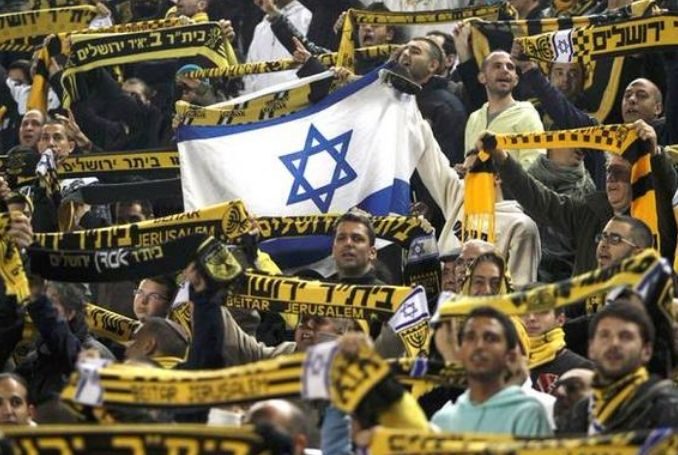By Issam Khalidi

Just recently Sheikh Hamad bin Khalifa Al Nahyan, a member of the UAE royal family, has pledged to invest 300 million shekels, or about $90 million, into the Beitar (Jerusalem) club over the next decade.
It wouldn’t be a big surprise if Al Khalifa invested in a club other than Beitar. This deal even made many Israelis surprised. The question that comes to mind here is why did Bin Nahyan choose to invest in this club? Does he intend to win the sympathy and favor of the most extremists in the Israeli society, or to fit the club’s deflection and adjust its racial behavior?
Indeed, it is merely a trading deal without looking into its political and moral dimensions. Also, as Rina Bassist mentioned in Al-Monitor “Not only was the deal a most tangible and direct result of the normalization agreement between the two countries, but it also confronted Beitar fans with a new, almost unimaginable reality.”
It is an illusion to think that Bin Khalifa and others are interested in purchasing historical documents that were stolen from Palestinian homes, libraries and institutions as a result of the Nakba (i.e., catastrophe) of 1948, or restoring homes and landmarks that were abandoned by their residents who became refugees in neighboring countries.
Bin Khalifa said that his investment represents “the fruits of peace and brotherhood between the two countries and this step will further bring people together through sports.”
Of course, sport is soft power and a great tool for peace, brotherhood, and friendship that could bring people together. However, in order to bring Palestinians and Israelis together through sports few things are required. The most important of which is ending the Israeli occupation. Friendly meetings and tournaments cannot be undertaken under repression, land confiscation, checkpoints, apartheid wall, blockades, arrests, and killings. Rather, under an independent Palestinian state and equal rights for Palestinians.
Israel is the only beneficiary of this deal, as it is the beneficiary of all its normalization agreements with other countries, and other peace agreements signed with Egypt, Jordan, and PLO. This club and its fans cannot be tamed, because the epidemic of racism is so rampant, its roots are so deep in the Israeli society that it cannot be eradicated. Today, it is not surprising to see that a new Israeli generation is born with genes of racism.
Despite the club’s apparent enthusiasm over the deal, many of Beitar’s fans remain upset at this shocking buyout. Fans have reportedly spray-painted offensive and racist graffiti on the walls of the stadium as a sign of their disappointment and anger.
Beitar is considered one of the clubs in the Israeli First Division Football League, known for its hardline stances against Arab and Palestinians, and there is no Arab player among its ranks. Fans of “Beitar Jerusalem” are historically considered hostile to Muslims and Arabs, especially the notorious far-right fan group “La Familia” known for its songs against the Prophet Muhammad. In 2016, nineteen members of the group were charged with attempted murder, including supporters of rival squads.
In October, the Arab member in the Knesset, Ayman Odeh, requested the removal of a racist song by the “La Familia” group that insulted the Prophet Muhammad that was published on “YouTube”. The site later removed the video from its platform.
This football club in specific has never had any Arab player on its ranks. Two Palestinian citizens of Israel who play on Israeli teams describe the racism and violence they are subjected to by Beitar fans. Alaa Abu Saleh, who plays for Bnei Sakhnin, says “It’s like war.”
In June 2019, the club refrained from joining the Nigerian player, Muhammad Ali, because of his name, or changing his name, as a condition for accepting his play with the team.
Beitar team relies on its popularity on the people of eastern sects who usually live-in poor neighborhoods and are known for their hatred of Arabs, and most of them belong to the religious parties and the Likud party.
Beitar was founded by the revisionist Jabotinsky in 1926 emerged as a movement opposed to the workers’ Histadrut in Palestine, and the members wore brown shirts as part of the movement’s fascist coloration. As for those who split from the Haganah in 1930 and established (Etzel) and (Lehi), they were members of Beitar. Its members became involved in terrorist acts in Palestine in the 1930s. Haganah, Palmach, and Vaad Leumi these terrorist organizations played a pivotal role in the establishment of the State of Israel.
The club has been trying to change its image in recent years, and in 2017 it received an award from President Reuven Rivlin for its efforts in combating racism and significantly reducing the number of anti-Arab and Muslim chants in its matches. However, racism in Israel isn’t going away, it’s getting worse and has been spurred long ago by Zionism, which is a racist ideology.
The Jewish Holocaust survivor, historian, author, and a former president of the Israeli League for Human and Civil Rights, Israel Shahak wrote on the racism of Zionism and the State of Israel (1975):
“It is my considered opinion that the State of Israel is a racist state in the full meaning of this term: In this state, people are discriminated against, in the most permanent and legal way and in the most important areas of life, only because of their origin. This racist discrimination began in Zionism and is carried out today mainly in cooperation with the institutions of the Zionist movement.”
– Issam Khalidi is an independent scholar, the author of History of Sports in Palestine 1900-1948 (in Arabic), One Hundred Years of Football in Palestine (in Arabic and English), co-edited Soccer in the Middle East, as well as articles and essays on the subject of sports included at www.hpalestinesports.net. He contributed this article to The Palestine Chronicle.

No comments:
Post a Comment